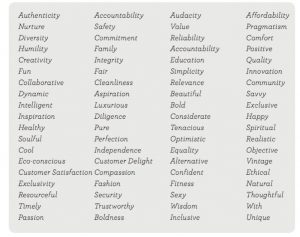Has there been a time in your life where what you did made you feel uncomfortable? Was there a deep sense of wrong doing as a result?
Have you just felt like you were lost?
Chances are that you were acting against your values.
I decided to write this post as I recently felt this sense of ‘wrong doing’, and wanted to share with you the importance I see of being true to your values, and to yourself.
It’s been an interesting journey I’ve taken in recent years, and I’ll be the first to admit I didn’t have a clear understanding of the concept of ‘values’, what they were, or how important they were in defining who I was, who I wanted to be, and what I stood for as an individual. Now I know.
Values are like signs on a road trip.
Values are there to guide you, to keep you on course as you navigate the adventure of life.
I’m going to use this blog post to discuss the concept of values and how important they are to your positive growth, and 3 ways you can use to find out what they are. I hope that with this new found awareness you’ll be able to start kicking harder, reaching higher, or looking in a previously unused cupboard which keeps the cookies you desire…….
Let’s do it!
What are values?
As I mentioned, values are like personal indicators that drive you to take certain action.
Personal values provide an internal reference for what is good, beneficial, important, useful, beautiful, desirable, constructive, etc. Values generate behaviour and help solve common human problems for survival by comparative rankings of value, the results of which provide answers to questions of why people do what they do and in what order they choose to do them.
~ Wikipedia
Values are there to drive us to unique, agreeable action. Action that aligns with our personality.
So that’s what values do, but what exactly are they?
Well, values are words. Descriptive words to be precise.
They’re words that you use to represent the desirable qualities, traits, morals and ideals that make you, you.
For example, here are some possible values you could adopt as your own:
This list in far from exhaustive. Use it as guidance as you read further and attempt to explore your own personal values in future 🙂
I’m confident you will. Here’s why…….
Why are values important?
The importance of values goes deeper than just fancy adjectives….
Values are used to provide consistency.
Let me explain.
Let’s say you go to a new hairdresser. The business you’ve found is clean, the patrons are friendly, and you receive an excellent cut. You can tell the hairdresser has a keen eye for detail, and the hour it took indicates that your hair was taken care of. You leave a very happy customer, and vow to return again in future.
You return to find the same stylist that tends your hair, but there is something lacking in the quality compared to last time. You aren’t offered a complimentary coffee, and the floors clearly have yet to be swept for the day. You are rushed through a cut and feel as though you were an interruption to their busy schedule. Strange you think, but you are adamant that you’ll give them another chance and it’ll be better next time.
On your third visit, you are informed of a price increase to account for rising overhead costs, and the stylist you normally have decided to move interstate. What initially attracted you to the place has dissolved. The experience has changed. You will not be back.
Notice what was lacking?
Consistency in experience.
Have a think. I’m sure there are many instances, not just hairdressing, where you act upon the expectation of consistency in an experience.
If your actions, words, thoughts, emotions are inconsistent, you find yourself in a state of confusion. Progression is slow, and resistance to that which is unknown is, well, impossible.
You need to define yourself in order to navigate the waters of your choosing.
Values be your tool.
How do you find your values?
Chances are you already know your values. You just aren’t aware yet.
That’s the trick.
Self-awareness.
Realizing your values is a result of the self-awareness process.
Depending on the level of self-awareness, most of us won’t have ‘categorised’ our ways into values before. We simply act upon them without recognising what they are.
Besides being a tool to determine your values, self-awareness is valuable on many levels.
Research shows that successful people share the common trait of self-awareness.
They spend time listening to their inner being, and realizing who they really are outside of external influence.
In fact, people who are self-aware are generally:
- able to find ways of achieving objectives that fit their personality
- understand their limitations and where they are not effective
- more likely to pursue the right opportunities, in the right way, at the right time, and get the results they desire.
So, becoming self-aware and present to your personal values has the ability to boost the quality of your life.
How do you find out what they are?
There are a number of ways, including the following.
1. Create a list of your activities and dreams
What do you get up to in your spare time? What do you do for work? Do you have hobbies, interests, dreams and desires? Sure you do.
Write them down.
These ‘snippets’ of your life are valuable pieces which highlight what you gravitate towards.
Love hiking in the forest? Chances are you value your environment.
Love your teaching job? A big part of that is likely your desire to give back or contribute.
Take your time. Write a list, keep it close, and visit it frequently.
Although your values seem like they wouldn’t change, they will. You’ll find that they’ll change as much as you do, so don’t be afraid to edit the list.
A values list isn’t concrete.
Concrete is solid, but it only lasts a certain time before it’s replaced. That’s because concrete is only as solid as the foundation it’s built on.
Values are a bit like concrete.
Some of your values will stay, some will need to be replaced. It depends how ‘solid’ they are.
Be free. Explore and modify as you feel, until your foundations are strong.
2. Take a test
If you’re scientifically minded like me, I’m sure you’d be interested in a tool that helps you out.
The good news is there are plenty out there on the web – some free, some not – with varying degrees of effectiveness.
This free test by Anthony Robbins is extremely comprehensive. It’s a one-stop-shop and uses the personality profiling principals of DISC to provide insights into your personality and the values that compliment it.
I found it extremely good as an introduction to the value finding process. It provides good explanation and background into the theory, psychology, and how the information can be used effectively.
This is not the only one. Try taking a look on Google for more resources.
3. Shake up your routine, and travel!
What’s a better way to ‘discover yourself’ than to spend quality time doing what you really love to do?
Travel can provide clarity, time, and space for self-awareness to evolve, if done the right way.
I recommend travel for a period of 2 – 3 months.
It takes 30 days (1 month) to successfully build habits and a solid routine, and even longer to break them.
I’ve embarked on 2 such journeys – 6 months in Europe and 2 months in Asia – and found the ideal time to be around 3 months for me. If you’re in a situation to just ‘run with it’ and travel for as long as you feel, that’s perfect.
In any case, start with a minimum of 1 month. Any less will be a waste of your time as you continue to follow habits, processes, and engrained ways of being to survive in a foreign land.
In order to truly find yourself, you need to get uncomfortable, then have enough time to determine how to get comfortable again in your new environment.
Leave what you have been ‘trained’ to do in your everyday life (due to necessity, convenience, or for lack of a better means). Explore yourself and the world at the same time.
It’s a challenging, liberating, rewarding, and enlightening experience.
There you have it. If you’re feeling a bit lost in life, you’ve got a place to start.
When feeling lost, turn to your values.
Try one of my 3 methods of discovery – documenting your life, official tests, and travel – to make your own list and start using it as a reference.
In your darker times (of which you will certainly come across), turn to these and alter your path according to their guidance. Use them and have faith that your resulting actions have a greater chance of leading you down the right path, rather than around in circles.
How’d you go? Have you made your list yet? Did you already have a list and decide to refine it, creating a new, firmer foundation? I’d love to hear your thoughts and what direction you’re choosing to take as a result of awareness to your values. Get in touch!
I appreciate you taking time to read my work. If you like it, please share it with your friends on social media.
The more people I can inspire, the happier I’ll be.
Yours in inspiration,
Jason


